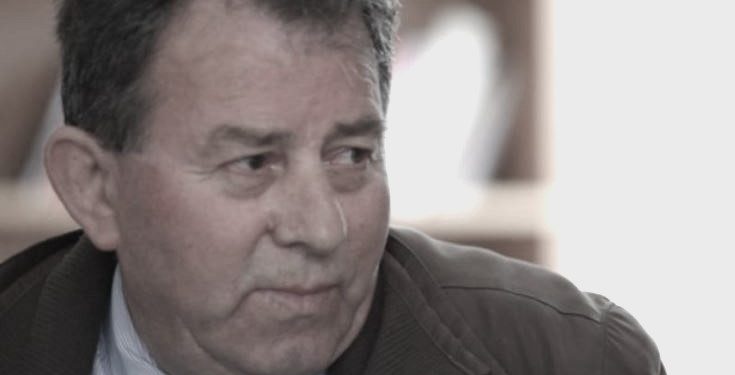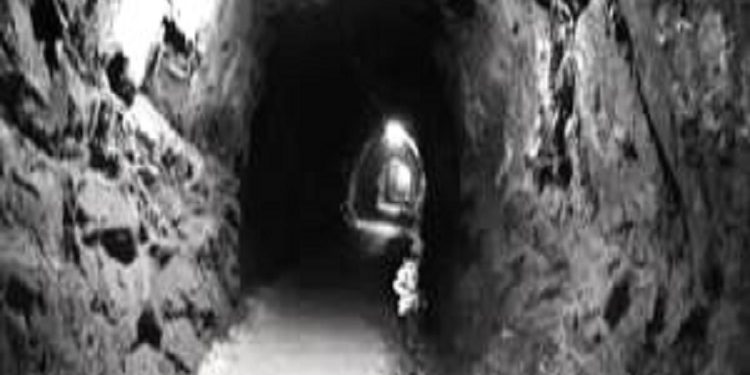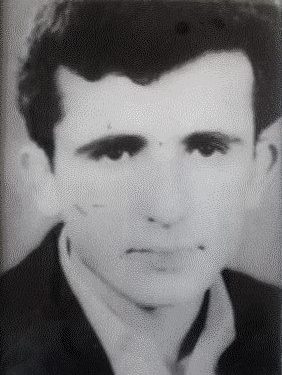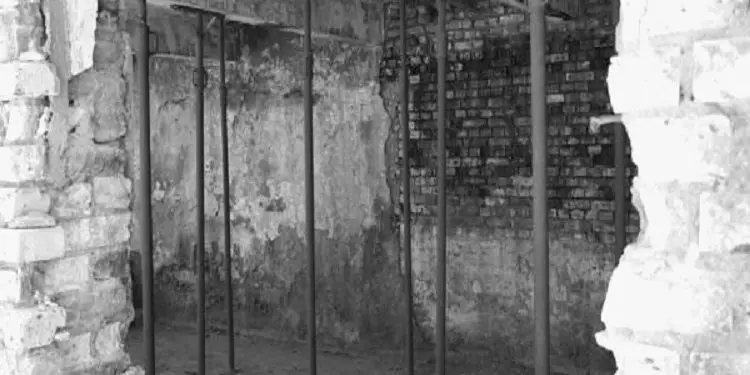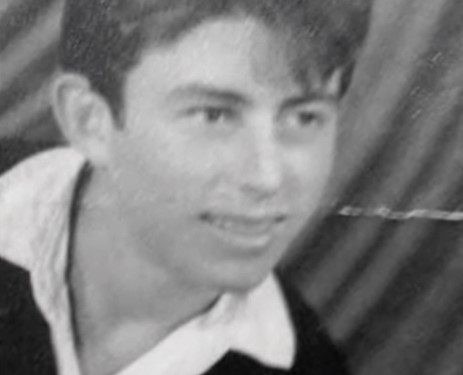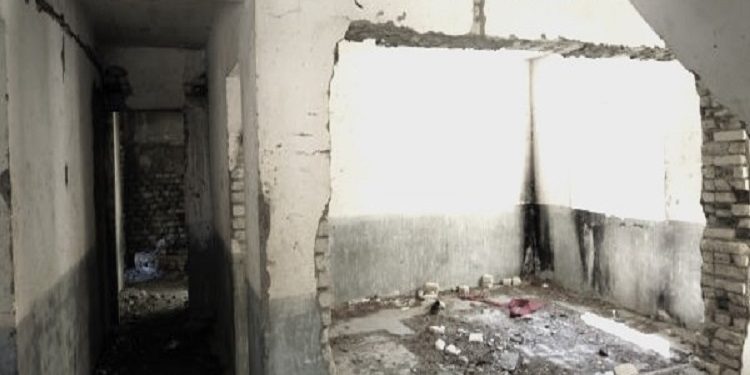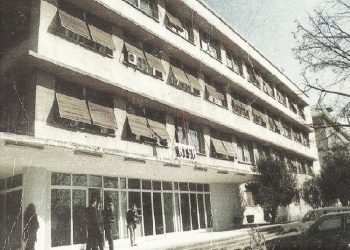By Shkëlqim Abazi
Nineteenth Part
Memorie.al / I were born on 23.12.1951, in the black month, of the time of mourning, under the blackest communist regime. On September 23, 1968, the sadistic chief investigator, Llambi Gegeni, the vile investigator Shyqyri Çoku, and the brutal prosecutor, Thoma Tutulani, massacred me at the Department of Internal Affairs in Shkodra, they split my head open, blinded one of my eyes, deafened one of my ears, after they broke several of my ribs, half of my molars, and the thumb of my left hand. On October 23, 1968, they took me to court, where the miserable Faik Minarolli gave me a ten-year political prison sentence. After half of my sentence was cut, because I was still a minor, sixteen years old, on November 23, 1968, they took me to the political camp of Rreps and from there, on September 23, 1970, to the Spaç camp, where on May 23, 1973, in the revolt of the political prisoners, four martyrs were sentenced to death and executed by firing squad: Pal Zefi, Skënder Daja, Hajri Pashaj, and Dervish Bejko.
On June 23, 2013, the Democratic Party lost the elections, a perfectly normal process in the democracy we claim to have. But on October 23, 2013, the Director General of the reborn government sent order no. 2203, dated 23.10.2013, for; The dismissal of a police officer. So Divine Providence was intertwined with the neo-communist rebirth Providence and, precisely on the 23rd, I was replaced by none other than the former operative of the Burrel Prison Security. What could be more significant than that?! The former political prisoner is replaced by the former persecutor!
The Author
SHKËLQIM ABAZI
Continued from the previous issue
RREPSI
(Forced Labor Camp)
Memoir
After a Rambouillet, where another Hashim was coming to the scene, important decisions were made about the fate of the Albanian people of Kosovo. Rambouillet changed the political map of the Balkans, but, unfortunately, it also realized one of the predictions of Hashim Toplica, who told us in 1969, the division of the Albanian nation into two states. A prediction that I and many of my friends did not believe, we called it his mistake due to lack of information. However, with the help of NATO forces, the wrong decisions were corrected by those who had once erred. The Albanians won the freedom they had dreamed of for generations! It was precisely during this period that, like most Albanians who opened the doors of their souls and homes to receive and alleviate some of the pain and troubles of their blood brothers, caused by Serbian repression, I also got involved.
In my city, three reception centers were set up in three former military barracks, where most of the refugees were initially housed, because some were sheltered in the families of Berat, who shared their poverty with their Kosovar brothers. One of these days, in the Morava camp, I met an elderly man with the last name Toplica. I immediately remembered Hashim, so I asked the old man where he was from. “From Prizren!” – He replied. When I said that the last name Toplica reminded me of an old friend of mine, who was no longer alive, he asked me for his name, and I told him. But the old man was silent; he sat down exhausted on a half-rotten wooden stool, took the white plis (a traditional Albanian felt cap) from his gray head, and sank into deep thoughts.
I also sat next to him; the board creaked under my weight. The creaking of the floor brought the old man back to reality; he turned to me and looked at me with eyes widened by surprise and disbelief, as if returning from a distant world. “For God’s sake, my friend, I can’t believe you knew Hashim! It’s been a lifetime since he was in Enver’s prisons! He has lost his land and his grave!” I wanted to interrupt him, so I let him vent all these exclamations; as he vented to the last point, he fell silent and sank back into his new world. When I realized he had no intention of speaking anymore, I got up and left him where he was, and continued my visit to the other tents.
The next day I returned to the routine visit. I was accompanying a team of doctors from the regional hospital that had come to visit the sick; because an epidemic of diarrhea had spread among the many children in the camp. At the entrance door, near the guard soldier, I almost ran into the old man from the day before. He didn’t wait for us to exchange good mornings, but addressed me: “I’ve been waiting for you here for two hours! I want to talk to you!” “I have to accompany the doctors to the tents, to the sick children,” I said and walked after the doctors. “Stay, man, you’re not a doctor! There are plenty of others who do this job; I haven’t slept all night waiting for you!”
I left and gave the task to someone else. We entered the narrow club of the barracks. The tables were full, but an old man got up and made room for us at his table. Before we even sat down, the waiter brought us coffee. It seemed the other old man had ordered before we both entered. The acquaintance briefly introduced me: “This is the one I told you about yesterday! He was a friend of Hashim!” From his facial expression, I noticed regret for the disbelief of the previous day when he had doubted my sincerity.
The other one in front of me, a little younger than the first, extended his hand and greeted without speaking. He had a face with deep wrinkles, like furrows opened by a pickaxe, thick eyebrows, under which a pair of light brown, scowling eyes were looking at me. On his head, he wore the characteristic white plis, wrapped around his forehead and ears with a turban of coarse cloth. “Are you a man? – I greeted him.” “By God, we are fine!” “How are your families?” – I asked him more out of habit. “These here, are fine; may those who have been left to fight with the Serb be well and may God protect them!”
“Where are you from?” – I continued to ask him. “We are cousins!” – the older one jumped in. – “Originally from Toplica?” “Yes, we’ve been away from the village for forty-five years and have settled in Prizren with some of our cousins. – He continued. – Now, we want to hear from you, who you are and where you met our cousin, Hashim?! For God’s sake, we have a great concern for our relative who is completely lost! For God’s sake, we want to hear a word about him!”
I told them who I was, where I had met Hashim, I spoke to them about the suffering and misery he had endured in prisons, as much as I knew, because I only lived with him for two years, while he spent a lifetime in prison. Then I told them about his unwavering character and the endless love he had for the Albanian people and nation. I spoke to them about his political thoughts and about the predictions for today’s events and their course, made thirty years ago. They looked at me directly at my lips, as if Hashim or his shadow would suddenly appear from my mouth. When I finished, they looked at me one more time in the pupils of my eyes, then after exchanging meaningful glances with each other, the older one jumped in:
“Yes, by God, Hashim was just like that! He was the smartest head of the family, the bravest, but also the most volatile. He was a determined communist! He sacrificed everything for that cursed ideal! His family, his kin, his village! After his escape, we suffered greatly from the UDBA; they put all the men of our family and village in prison. After prison, we moved. We had thought that Hashim had escaped from Ranković, but we were very wrong, he had it worse than us! At least we had it with the Serb, but he had it from his own brothers! Right, Sadri?” – He addressed the other, as if asking him to reinforce his newly expressed opinion.
“Yes, man, that’s right!” – the other one said, without adding another word. When I told them about Hashim’s thoughts, about the division between Albanians on this and that side of the border, about the hostility that Tito and Enver had incited, the old man lifted the plis from his head and, wiping his forehead with a dirty cloth, he scowled as if stung by a hornet and scolded me: “No, my man, on this point Hashim was wrong, we are brothers by blood and language. Our mothers and fathers could not divide us! If he were here today and saw how the Kosovars were welcomed by their brothers, he would change his mind! I swear, in times of trouble, a good person is known! What you have done for us, I don’t know if we would have been able to do for you, in the same trouble! A brother eats his brother’s flesh, but protects his bone!
Truly, Enver had blinded us; we called him ‘Bac’ (father), because we saw in him the issue of the motherland. It is true that in every house in Kosovo and wherever there are Kosovars in the world, they had a photograph of him, but we didn’t know what he had done to his own people! For God’s sake, we also called Hashim unjust to ‘Bac’ Enver, but now that we are seeing and hearing all these horrors he has done to the people, our eyes have been opened. That’s exactly why I didn’t answer you yesterday! What do you say, Sadri?!” – He asked the other for help. “Yes, by God, that’s right!” – Sadri affirmed bluntly.
“You have comforted us with what you told us about our relative. Now we will tell others about these deeds of Hashim and we will look for where he might have been buried, to find his bones. We want to thank you and your family.” “No, I want to thank you; you have relieved me of a worry that has weighed on me for thirty years. By telling you, I feel free now. Anyway, when I take stock of the events that have happened and compare them with Hashim’s predictions in 1969, it turns out how accurate he was, both for the time and for the others.
Today we are two Albanian states, with two slightly different mentalities, with two different flags, even though the National Flag leads us in joy and sorrow. Indeed, a part of today’s politicians have this situation very much at heart, just as Hashim had predicted, but the feeling of mutual love is what warms me and keeps the hope alive that in the future we will be, as our enlightened ancestors dreamed and hoped; one nation, one blood, one language, one body, one heart.”
Let’s return to the chronology where we left off. The date November 29 passed between hope and disappointment. Those who had chattered so much about the long-awaited pardon, and had even boasted that they had hit the nail on the head, determining not only the date but also the exact time when the names of the beneficiaries would be read, and then had spent the whole day with gossip, coffee, and tobacco, from one person to another, as soon as the afternoon roll call ended, they covered their heads with blankets and disappeared from circulation, as much as you could hide there.
The disappointed, those who had shared coffee and cigarettes all day, hoping and believing in the words of the oracles, at the end of the roll call, had gathered together in despair and were lamenting their troubles head to head, with each other. They were not just mourning the missing pardon, but also the days they would have to count until their families replaced the lost portions of coffee and tobacco. The skeptics, those who had warned since the morning about the communists’ usual mockery on the eve of the November holidays, now strutting about from bed to bed and from group to group, were declaring in even louder tones:
“Well, you saw it, we were right! Open your eyes, you blind people, and look at reality, these people only know violence, prison, and the gun! God willing, they’ll break their necks as soon as possible!” and they would go to the next group. As for me, after getting over the initial bewilderment, when I actually believed that some miracle might happen, I went to my bed. From there, between two good old men, I followed the commotion and gossip in the barrack. On the one hand, I felt sorry for these old men who were badly disappointed in their unrealized hope, on the other hand, I thought that one day I would also end up in that state of psychological distress.
From the height of my pillow, I turned my gaze to the two bed frames and noticed the gloomy faces. Next to me, old man Esheref was carving on the yellow boxwood and with a slight whistle, he had given a melodic line to the well-known song from Dibra of Hajredin Pasha. Meanwhile, the priest was absorbed in the yellowed pages of an old book without a cover, which must have been quite interesting, as he did not lift his head for a single moment, even when the noises rose to the heavens.
Where did my mind not go in those moments! To the freedom that was getting further away every day, to the captivity that would last five years, to the hopes that were fading with time, to the indifference of my bunkmates! My mind was clouded by a doubtful question: “Will I also end up like this, automatically? In a soulless, spiritless, and weak-willed lair?! Oh God!” But I would soon realize I was wrong. When I returned to my place after the roll call, Vaska and old man Esheref were chatting:
“I don’t know what to say, my friend, I can’t explain the confusion of the overwhelming majority! I feel sorry for the finding! How is it that they don’t understand that the political circumstances are opportune! – Vaska continued the reasoning he had started without my presence. So be it, I forgive this to the young, but we, the elders, the oldest in prison, have a duty to explain it to them with realism, directly and without gloves; to talk to them about the current situation, of course without killing their hopes. Let’s tell them clearly, confront reality! Hope, but resist! I don’t hope that the ignorant will understand us, but I won’t forgive the intellectuals!” The priest fell silent, gave me a friendly look, and continued:
“Oh my friend, today the class struggle has reached its apogee. See the savagery against faith and the faithful, the pressure exerted on the new generation to implicate them in this unprincipled war! Then read the international situation, it is not at all in our favor. It’s only been a few months since Russian troops occupied Czechoslovakia, yes, and on the southern borders, a junta of colonels has triumphed, in the north some similar to ours, even though they pretend to be a little softer, they still remain communists! We are in a geographical position where there is not much hope of being transformed into an object of geostrategic importance for the greed of the Westerners.
To conclude, I would like to add that even the communists are threatening themselves, because the connection with distant China has ruined the balances in the Eurozone, they are now in ideological conflict with the Euro-communists. From the Far East, they have imported here, in addition to the pseudo-Cultural Revolution, also the model of the new man, which must be accepted that he can be everything, but not a human model! So, as always, they continue the fight with each other, which, if I am not mistaken, cannot be finalized without heads on a platter. Woe to him who hopes for justice from the wicked and mercy from the executioner!”
“Yes, you are right, priest! I am uneducated, I can’t speak so beautifully, but I understood this much in time, unlike the more cultured ones!” – he blew the wood chips he was carving and turned to me: – “But we can’t do anything, my boy, this is prison! This is the dough, these are the people! They want to see dreams in the sun! Let them see! Well, I also see dreams of freedom sometimes!” – Old man Esheref completed the refrain that the priest left out. – “Boy, I advise you not to listen to what the dreamers are grinding! Look after your trouble, and get well first, then God will provide! Try to get something good too! Look, this is how we found the prisons, and this is how we will leave them! Thank God we see dreams, because if we didn’t even see those, we would have killed each other!” – he concluded.
I pushed for a few more days with the report that Dr. Çitozi gave me. My friends who came from Shkodra with me had been sent to work in various brigades. Now I only met them in the evenings, when they returned exhausted. When I looked at their blistered hands, full of wounds caused by the handles of the pickaxe and shovel, I waited anxiously for the day when I would have to grab those cursed tools myself. The long time in isolation had hidden all signs of calluses from the soles of my feet, physical weakness and inability to adapt to physical work, plunging me even more into this nightmarish state so much so that my heart trembled.
All those days, my friends left no stone unturned, they used their connections and acquaintances with each other, to get me an easier job. Thanks to the report of Dr. Naim, the acquaintances of old man Daut and Sulo, but especially the closeness of Vaska with the head of the Technical Office, Tefik Tarelli, since they were from Korça, and also because of my minor age, they assigned me to work in the brigade of the “Tekahytë” (The Technicians).
In the labor camp
(Where patience was forged!)
Finally, they sent me to work. It must have been the first week of December, but I haven’t fixed the date. I still felt weak, the illness and apathy from the long stay in the dungeons had exhausted me. However, that mild day, with sunshine, as rarely happened in the wild winters of the Fan valley, was tempting. In the alley that connected the two camps, in the morning lineup, I found myself next to unknown people. Except for the master, a man from Korça named Gaqo, whom they affectionately called Gaqkë, whom the priest had introduced to me the night before, I was seeing the others for the first time.
I want to emphasize that my acquaintances in the camp, the priest and old man Esheref, as bunkmates, but also Sulo Gorica, my dear man from Berat, Daut Runa, the loyal man from Labëria who would become my father and mother, the lame man, the sweet-spoken Emin, who would leave me his belongings and his property, accumulated in the long years of prison and I would not have the chance to meet him on the day of my release or ever again in my life, the mustache-blond Karolin Shala, the porter of the first day, but also my friend in later years, but also the others, friends of my friends, whom I would get to know later, became in those days my tutors and defense lawyers for my interests, and I cannot imagine what direction my later life in prison and outside of it would have taken, if I had not had the material and psychological support of these wise men. Anyway, with the later tempering in prison and after my release, I have tried to justify the support they gave me at that time.
I was the last to cross the gate of the labor camp, because the brigade where I was assigned also lined up last. This was for two reasons; the first: because it was composed of slow old men, chronically ill people, and the second: some of the brigade members were the most trusted people of the command and as such, they had to close the line, for security. In this brigade, the cell spies resided, after they returned from their missions in the interrogation centers. After they were used as bait, to “catch a big carp” (an activity we will talk about in turn), or they were brought as false witnesses to the new enemy groups, to worsen their positions, as if they were part of dangerous international intelligence agencies, which then through monstrous sentences, would blackmail the terrorized public; finally, they would bring them for “summering.”
So, this whole category was placed in this brigade for differentiated treatment. There they would pretend to work, but in fact, they were just lounging around. Since they had no work, they spent all their time strolling from front to front, or from group to group, and inciting fights. Of course, this is how they also fulfilled the duty they knew how to do best, and which they had been entrusted with, spying. The other part of the brigade was filled with genuine masters, such as engineers and technicians of various specialties, skilled craftsmen in their professions, whose need was felt. But this category, in every case and circumstance, were the most timid and cowardly, they lived with the anxiety of losing their job and the terror that they might then end up, with most of them, with a pickaxe and shovel.
The overwhelming majority, who, even though they were truly capable specialists, were assigned to this brigade, not simply as finished professionals, because there were countless of them in prisons, but because of their advanced age and incurable diseases they had inherited as a result of the long years of punishment. At least here, they were still serving for something and were not eating the government’s bread for nothing; they were using their powers to the extreme. The brigade was led by a Montenegrin, a fanatical communist who had fled from Yugoslavia after the death of Stalin. He had come to Albania, hoping that he would be welcomed as an anti-revisionist. And indeed, he was initially welcomed very well; they assigned him as a Russian language professor in a high school in the city of Elbasan.
But very soon for the sick idealist, the troubles would begin, the cult of the individual and the endless dogmatism that the Albanian leadership applied, would badly disappoint the twenty-four-carat communist. Used to his country, where the expression of opinion was tolerated a little more, he would express himself here without reservations. But with us; “that’s not how things worked”! They left him, they left him, and when he had filled the cup, they arrested him. With false witnesses, after a farcical process, as communist trials usually were, they sentenced him and he ended up in labor camps. So, the anti-Titoist communist was punished as a staunch Titoist! From that moment on, an inseparable shadow of disappointment was stamped on his face, which remained with him for his entire life. Velko Stepanoviç, that was the name of our brigadier, was a tireless worker. Even though he was maimed, with the thumb of his hand missing, he was good at everything; his hand did what his eye saw.
Even though he was a convict, the communists valued his contribution in the field of Marxist-Leninist theory and his work skills, they offered him the opportunity to lead the brigade of craftsmen or, the “maimed” (it’s not for nothing they say: a crow doesn’t pick out the eyes of another crow), and Velko Stepanoviç, accepted it. As a straight and honest man, serious and cultured, he valued people with virtues and a strong character, as I would prove myself after a few weeks; but politically, he had remained an incorrigible idealist; it was clear that he had been totally indoctrinated by the utopian communist ideas since he was young. I can add without being wrong that he must have left this world in that state.
Despite his ideological flaws, Velko represented a positive person; everyone valued him for his intellectual qualities, his prominent intelligence, and his unbreakable character. My friends also judged him that way. I would also recognize these values when I had the chance to be put to the test. That serious man, with a wide mustache over his thin lips, did not agree to blame me, on the contrary, he stood by me and encouraged me in my intransigent stance, at the very moment when I needed this encouragement the most./ Memorie.al




